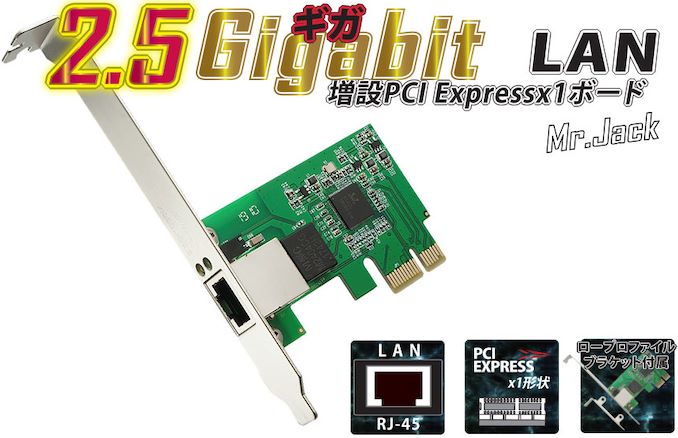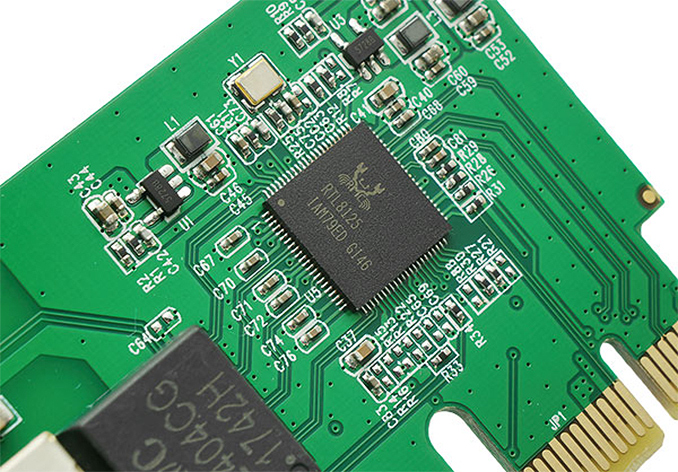Realtek 2.5 GbE PCIe Cards Now For Sale
by Anton Shilov on October 24, 2019 4:00 PM EST- Posted in
- Networking
- Realtek
- 2.5GBase-T
- Ethernet
- 2.5 GbE

A Japanese company has started sales of its 2.5 GbE network card that uses a Realtek controller. The adapter is a low-profile PCIe 2.0 x1 board that is compatible with the vast majority of desktop PCs that are used today. However, it isn't as cheap as one might expect.
The 'Area Mr. Jack' 2.5 GbE LAN (SD-PE25GLAN-1L) network adapter is a low-profile PCIe 2.0 x1 card based on Realtek’s RTL8125 controller launched over a year ago and currently used on some motherboards. Measuring 80 mm by 44 mm, the card is very small and simplistic, it has one RJ-45 connector and is equipped with two status LEDs. Besides 2.5 GbE (IEEE802.3bz 2.5G BASE-T) over conventional Cat5/Cat6 cables, it supports previous-generation protocols too, including 1 GbE and below. For OS compatibility, the NIC comes with drivers for Windows 7/8/8.1/10, whereas the status of Linux support is unclear.
The Area Mr. Jack 2.5 GbE LAN card costs ¥3,980 including tax ($33.30 without VAT), which is not a particularly low price considering the fact that GbE ports are ‘free’ with most motherboards and Aquantia-based 5 GbE and 10 GbE cards can be bought for $70 and $90, respectively. Also, as there are no cheap 2.5 GbE and 5 GbE switches on the market yet, one will have to use a multi-mode 2.5/5/10 GbE switch, which is not cheap as well, so using 2.5 GbE cards instead of faster options may not be that economically viable.
But there is a catch about this card: it only uses a PCIe 2.0 x1 slot. It can be installed into every desktop with a spare PCIe 2.0 x1 slot, which essentially means any desktop launched in the last 10+ years as well as low cost systems that only come with PCIe 2.0 x1 slots. By contrast, 10 GbE cards come with a PCIe 3.0 x4 interface, whereas 5 GbE cards feature a PCIe 3.0 x1 interface, something that the cheapest PCs based on Intel’s H110 and similar chipsets does not support.
Related Reading:
- Things We Missed: Realtek Has 2.5G Gaming Ethernet Controllers
- Intel Quietly Mentions 2.5 GbE Ethernet Controllers
- Aquantia Multi-Gig: Single Chip USB 3.0 to 5G/2.5G Dongles Coming Soon
- Club 3D Launches 2.5 GbE USB Type-A & USB Type-C Dongles
Source: Area (via Akiba PC Hotline)











53 Comments
View All Comments
Golgatha777 - Thursday, October 24, 2019 - link
For me personally, it's mainly the cost of the switches. NICs have been affordable for quite awhile now. However, I'm willing to pay about $10 per port for a 2.5G backbone for my network. I'm tired of my Ethernet connection being the weakest link for data transfers across the network.GreenReaper - Thursday, October 24, 2019 - link
Who gets to use it? People who use two cards in a point-to-point network. You may well only need it for one connection right away, and once you do get a switch the cards should still be useful.azazel1024 - Tuesday, October 29, 2019 - link
It requires extra ports and/or extra cabling though to do that. I haven't wanted to deal with that so I haven't done it. Otherwise I am with Golgatha, other than the fact that I am fine if my core switch isn't 2.5GbE+. I don't mind stacking a small low port count switch on top of a core GbE switch. Ideally I'd love it all to be in one. But I am also not willing to pay more than about $150 or so for such a switch that has a low port count. Future proofing I wouldn't mind paying more than that for a larger switch to cover my whole network, but there I am still talking maybe no more than about $300, but that better be for a 24/26/28 port switch.Valantar - Friday, October 25, 2019 - link
Yeah, the dearth of switches is a serious problem. Current consumer offerings are terrible, usually having only two 10GbE ports for an exorbitant price, and a handful of GbE in addition to that. Don't see the point of those at all. I'd gladly pay 2-3x the price of an 8-port GbE switch for an 8-port 2.5GbE switch, or even better one with a couple of 5/10GbE ports.AnarchoPrimitiv - Sunday, October 27, 2019 - link
Dearth of switches? I literally saw a Netgear multigig switch (1/2.5/5/10) on sale on Amazon just yesterday for under $200. I have a home 10gbase-t network and even my switch (Netgear XS728T which is for a business) is under $1000 now. Even Asus sells a 10GBase-T switch for $100 these days... There's tons of 10gig and multi gig switches available that are affordable so I'm guessing you made your comment without doing some research firstAnarchoPrimitiv - Sunday, October 27, 2019 - link
BTW, I have symmetrical Gigabit internet (980Mbps down/ 975Mbps up) and for only $70/month, along with a 250TB RAID 50 Server/NAS running nurmerous Virtualized machines to several Thin clients around the house with three storage tiers (with the top tier being 4x HP EX950 m.2 nvme SSDs on a Highpoint Solutions SSD7103 pcie 3.0x16 RAID adapter that reaches close to 16GB/sec) that currently uses an Intel X710-Tr4 four port 10GBase-T NIC with all four ports aggregated together for a 40Gbps backbone. So yes, I need 10GBase-T networkingBurntMyBacon - Monday, October 28, 2019 - link
Netgear XS728T - Just checked amazon and this is going for $1889.90. As this switch very much matches my criteria, I'd love to know where you got it for <$1000 new.Asus XG-U2008 (got the model from your downstream post) - $249.99 at Amazon. Only has 2x10G ports. This is frustrating as 3x10G ports would have allowed me a server, workstation, and uplink port, but only two ports requires a sacrifice I'd rather not make. Also reliability is apparently a concern.
Netgear MS510TX (first multigig switch I found) - This goes for $269 at amazon. It has 4x1G, 2x2.5G, 2x5G, 1x10GBASE-T (Copper), and 1x10GBASE-X SFP+ (fibre). This could work for some environments, but I have to wonder if it really makes sense to have so many different max port standards when all the multigig ports could have been 10G (given that it also supports 5g and 2.5G). At the very least I don't understand why they didn't make the 2.5G ports 5G given the 2.5G compatibility and marginal price difference.
It would seem prices have moved back up since you posted yesterday. Beyond that, the cheaper models have a number of quirks and trade-offs that limit their use. That said, it does appear that their are more options available than their used to be as long as you can deal with some of the trade-offs. Even if it is slow, it is good to see the market moving again.
https://www.amazon.com/NETGEAR-28-Port-Ethernet-Li...
https://www.amazon.com/ASUS-XG-U2008-Unmanaged-2-P...
https://www.amazon.com/NETGEAR-Multi-Gigabit-Ether...
Dug - Monday, October 28, 2019 - link
You can still use xs708 for 8 port $550xs716 16 port $900
beginner99 - Friday, October 25, 2019 - link
Nope. Your aren't missing anything. The real issue are switches and most people that run >=2.5 usually use old enterprise gear that is relatively cheap to get of course with the "cost" of being huge and power hungry. I don't want a 20 port switch that's bigger than my PC...when 1gb consumer switches are tiny and fit anywhere. yeah real problem are switches and it's easy to see why: because mosz home users prefer wireless anyway and that is where consumer companies are investing in. Much more profitable to sell you new wifi routers every other year than one 5 gbps router you will keep for 2 decades.AnarchoPrimitiv - Sunday, October 27, 2019 - link
Power hungry? You do know the average cost of a kWHr in America is just $0.125, right? I have a home 10gbase-t network and even my switch, a Netgear XS728T, which has 24 10GBase-T ports and four SFP+ ports is not big in the least at 17.3"x12. 3"x1.7", it's about the size of a cable box/direcTV receiver. Asus sells a 10GBase-T switch (the XG-U2008) that's much smaller at 9.45"x4.92"1. 06" which is small by anyone's definition. There are numerous 10GBase-T and multigig switches (that do 1/2.5/5/10 gig) on the market with numerous options under $300. With 4k and 8k streaming around the corner, everyone will need one, especially with families that have multiple streaming users at once